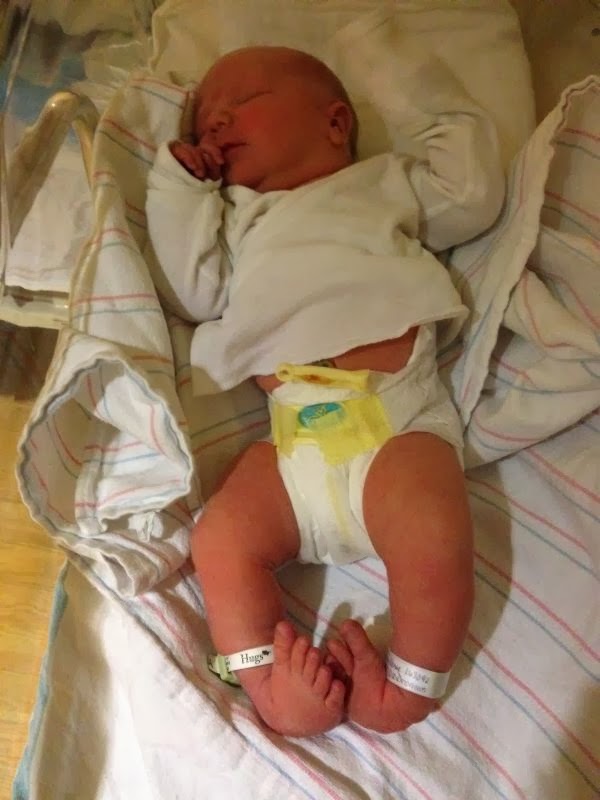What Wendy Davis’ political doublespeak means for children like my son
[Today’s guest post by JoAnna Wahlund is part of our paid blogging program.]
Last June, Texas state senator Wendy Davis became infamous due to her ultimately unsuccessful attempt to filibuster proposed abortion laws that implemented rigorous safety regulations on abortion facilities and also banned abortion after 20 weeks gestation (with exceptions for the life of the mother and severe fetal abnormality).
A few weeks ago, the Dallas Morning News reported that Davis “would support a 20-week ban on abortion that pays more deference to a woman and her doctor.”
“My concern, even in the way the 20-week ban was written in this particular bill, was that it didn’t give enough deference between a woman and her doctor making this difficult decision, and instead tried to legislatively define what it was,” Davis said in the article.
This statement is nothing more than political doublespeak. Essentially, Davis would favor a ban on abortion after 20 weeks as long as a woman could have an abortion for any reason after 20 weeks. She knows she’s being labeled as an extremist (and rightly so). Her strategy is to couch her position in pretty euphemisms like “deference between a woman and her doctor,” but in reality it hasn’t changed.
“Deference between a woman and her doctor” means a loophole that pro-abortion medical professionals can exploit, just like the late Dr. George Tiller did in Kansas. At the time he performed late-term abortions, state law required Tiller to obtain:
documented referral from another physician not legally or financially affiliated with the physician performing or inducing the abortion and both physicians determine that: (1) The abortion is necessary to preserve the life of the pregnant woman; or (2) a continuation of the pregnancy will cause a substantial and irreversible impairment of a major bodily function of the pregnant woman.
His source for these documented referrals was Dr. Ann Kristin Neuhaus, who lost her Kansas medical license in 2012 due to seriously jeopardizing the care of her patients. She essentially rubber-stamped Tiller’s second-opinion requests, using a computer program with “yes/no” checklists to make questionable diagnoses of severe mental illness and suicidal tendencies.
The Texas law, in contrast, stipulates that an abortion after 20 weeks can only be performed if:
(1) a condition exists that, in a physician’s good faith clinical judgment, complicates the medical condition of the pregnant woman and necessitates the immediate abortion of her pregnancy to avert her death or to avoid a serious risk of substantial impairment of a major bodily function; or (2) the fetus has a severe fetal abnormality.
Davis, it seems, would prefer a regulation similar to Kansas law, so that physicians could exploit the loophole—which means a woman could abort for practically any reason at all as long as she could find a doctor to sign off on it.
She also told the Dallas Morning News’ editorial board that “less than one-half of 1 percent of Texas abortions occur after 20 weeks of pregnancy. Most [emphasis mine] of those were in cases where fetal abnormalities were evident or there were grave risks to the health of the woman.”
Most, but not all. Given that the current Texas law has exceptions for severe fetal abnormality and grave risks to the life of the woman, Davis apparently feels that there are other valid reasons to abort a child who is 20 weeks gestation or older.
Several months ago, I was very disturbed to read a news story from the U.K. stating that women had had abortions for easily treatable fetal abnormalities such as cleft lip and clubfoot, but that these abortions were severely underreported in the official statistics. The reason I was so disturbed at the time was because I was pregnant with a child who had bilateral clubfoot.
 |
| An ultrasound of the author’s son, Peter, shows bilateral clubfoot |
My child’s condition was initially diagnosed at a routine anatomy ultrasound when he was 19 weeks, 3 days gestation. Around the same time Wendy Davis filibustered the Texas abortion bill because she wanted women to have the ability to legally kill children like mine, I had a Level II ultrasound to confirm the diagnosis. Three days after my son’s birth, we began treatment using the Ponseti method; today, at 4 months old, his prognosis is excellent. His feet are fully corrected; he currently wears a brace to keep his feet from relapsing, and in less than a month he’ll only have to wear it at night. The nighttime brace wear will continue until he’s 5, at which time (unless he displays symptoms of a relapse) he’ll be considered fully cured and will be able to discontinue brace wear entirely.
 |
| Peter, shortly after birth |
 |
| Peter today |
Wendy Davis believes I should have been able to abort him so I wouldn’t have to deal with his condition, if that was my choice, despite the fact that it is fully curable. I have no doubt that she also approves of the permissive abortion laws in Australia, where a doctor is in danger of losing his license because he refused to abort a healthy female fetus (the parents requested, and later obtained, the abortion solely because of the child’s sex).
We really have no way to know (given the abysmal standards for abortion reporting in the U.S.) how many viable unborn children are aborted due to non-terminal health conditions, or due to being the “wrong” gender. But the fact that such abortions happen at all is and should be deeply troubling—unless, of course, you’re Wendy Davis, who apparently doesn’t understand why there is need for a “legislative solution” when it comes to preventing the late-term abortions of babies.

Ugh, she frustrates me so much. If you're that powerful, well-known, intelligent, etc., why can't you use it all for good?
Most late-term are not committed for fetal abnormalities. That's just bogus.
Ron Fitzsimmons, of the national coalition of abortion providers, admitted that most partial birth abortions were committed on healthy mother carrying healthy babies. http://en.wikipedia.org/wiki/Ronald_J._Fitzsimmons
Wendy Davis deserves a lot of credit for taking on a movement that is largely comprised of religious extremists in a very conservative state who care very little about women's rights to reproductive health services. Everyone knows the real objectives of the requirements set forth in the bill she fought against. It is hypocritical to say that the bill was passed to protect women's health and safety and not to close clinics and make it more difficult for women looking to have abortions. It is so obvious that it is humorous.
Wendy Davis is the posterchild for Planned Parenthood and NARAL. (Who wants to guess who'll be funding her).
I really would vote her if her whole campaign wasn't started on the fact that she wants abortion without limits. (If I were a Texan too)
It's all up to the voters. I doubt that there are enough liberals in Texas to elect her. She was honest enough to call out the anti-abortion bill for what it really was. Question is does that qualify her to govern a state like Texas. Being an honest senator doesn't make her a qualified governor.
You want to call Wendy Davis honest? Really? She started lying about that very bill, saying she would have supported as it deferred to women… propaganda double-speak. She also lied about her hardluck story.
I think the bill was a mixture of simply anti-abortion legislation and concern for women health. To say it was only intended to regulate clinic standards would be obfuscation.
However, I do not think Wendy Davis is as honest of a hero as pro-choicers love to tout. I remember her saying something to the effect of "only physicians should have a say in regulating abortion". I wanted to say "when did you get your medical degree Wendy?"
I have such a hard time thinking about Texas politics, especially because I don't see them as honestly being pro-life. Let's not forget how many executions Texas performs.
I didn't like Wendy Davis long before her filibuster "fame", and I will not be voting for her. Bill S., not everyone in Texas is a religious extremist, and we all know what "reproductive health services" means: abortion. So it's humorous to you that legislators want to put restrictions on murder. Hmmmm
Great article. I appreciate this site so much.
I don't think it was so much the 20-week limit as it was the closing of clinics that couldn't meet unreasonable standards.
I shouldn't say it's humorous since they succeeded in getting clinics closed. It's dumb like a fox. If you are against the bill, you are maligned as being against women's health and safety. Who could be against that? Yet, we know the real objectives of the bill's sponsors were all about making it more difficult to get an abortion. The courts will eventually see through this ploy and strike down the law as being in violation of the 14th Amendment.
The standards are the exact same required of all other ambulatory surgical centers in the state of TX. Why do you say they are unreasonable?
If it's more difficult to get an abortion under dangerous circumstances (for the baby AND the mother), I don't see how anyone could be against that.
I have had a similar experience as those working at the clinics that have had to shut down. I worked at a hazardous waste facility in a town that was, of course, against our being there. The state wanted us to be there because we served an important function for industry. Under state law, we had every right to be there as long as we complied with state regulations. Under state law, the town couldn't just come up with regulations that would make it difficult for us to do our business. In Texas, the state is like what the town was to us. And the federal government is like what the state was to us.
Ultimately, it will be the federal courts that decided whether the state is over regulating the facilities in order to close them down or if the regulations and the law itself are justified.
If the depends upon whether the services provided at the facility would be considered ambulatory – surgical. Are the abortions being performed at these facilities as complicated and dangerous as ambulatory and surgical procedures?
It is difficult to judge on the honesty of politicians in general. I was only referring to her honesty in this particular situation. Overall, I think it is inappropriate for legislators who are against abortion to be setting standards for abortion facilities. They will just select the standards that the abortion facilities cannot meet in order to shut them down. The question that the federal courts will ask is whether or not there had been a problem with the facilities in the first place.
Yes, abortion is a surgical procedure, and abortion facilities meet the definition (in TX law) of an ambulatory surgical center: http://law.onecle.com/texas/health/243.002.00.html
I haven't looked at the link yet so this might be already answered on it. Why does it require a new state law to have these facilities covered under the existing requirements.
Prior to this law, abortion facilities were not required to be licensed as ambulatory surgical centers. Now they are.
Surely you can see a difference between executing a convicted criminal who has received due process of law and killing an innocent child? http://blog.secularprolife.org/2012/01/abortion-and-death-penalty.html
If unborn children could receive due process of law prior to their executions, I think that would be wonderful.
If, by definition, they were ambulatory surgical facilities before the law was passed, they would have been regulated as such and you wouldn't need a new law to require them to meet standards that were always applicable to them. Something isn't right about this. Does the law say that they are now considered to be that or just that they must meet the same standards? This will be important when the judge has to rule on PPs challenges to the law.
That was the purpose of this law, Bill – it was meant to stop abortion facilities from being an exception to the rule since they so clearly weren't. The law says that they have to be licensed as ambulatory surgical centers and meet the same standards as every other ambulatory surgical centers in TX.
Once again, the purpose of TX law was to clarify that abortion facilities DO meet the definition for ambulatory surgical centers (which they do, see the definition linked above) and require them to be licensed as such.
It's the other way around. Pro-lifers wanted to make abortions safer, and abortion facilities were unwilling to do so (thus, they shut down rather than comply).
Ok. Uncle! I give!
Pro-lifers supported this bill because it makes abortions safer. And pro- choice oppose making abortion safer and would rather see the clinics close. Got it.
I just see a bit of a schizophrenic nature of Texas politics.
I don't see a difference in the inherent right to life of a criminal and a baby. They both have the intrinsic human value.
Sure, intrinsic human value. But valuable or not, it's not inherently unjust to execute someone who has shown to be a violent threat to the right to life of other people.
I generally oppose the death penalty unless there's no other way to protect the populace. But I see a major difference between killing an innocent human being, and executing a human being found guilty beyond a reasonable doubt of egregious harm to other people.
I see the death penalty as cruel and unusual punishment. It always strikes me as crazy when people say that certain forms of execution are more humane than others.
I see your perspective, but given that killing in self-defense is moral, I don't see how that makes capital punishment wrong, since it's essentially a form of that (only done by a government after due process of law, as opposed to by an individual in the heat of the moment).